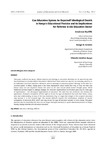| dc.description.abstract | This paper confronts two issues; reforms (repairs) and ideology in education. Machines can be repaired any time they breakdown or develop defects. Educational reforms have been carried out any time an emerging need has to be confronted. Can these education reforms be seen as repairing an education system? Ideology on the other is a coherent system of ideas; relying upon a few basic assumptions about reality that may or may not have any factual basis, but are subjective choices that serve as the seed around which further thought grows. When traditional societies began to undergo changes, the ritualistic legitimization of education gave way to a new type of legitimization - the ideological legitimization of education. The latter has two attributes: one involves the appearance of people’s recognition of their right to choose the type of education that suits their tastes, values, aims and understanding. In view of this new realization, they no longer feel obliged to the accepted education only because it is the accepted type. The second attribute requires the simultaneous existence of several conceptions of education, from which one may choose the type of education suitable to one's needs. This paper searches into the possibility that there are no longer ideologies necessary to guide educational practice in Kenya, thereby raising concerns over education relevance. | en_US |

